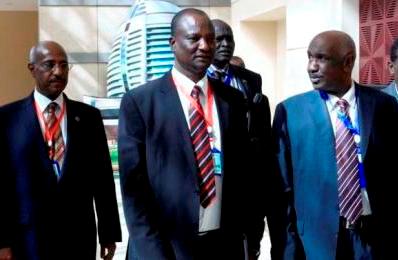S. Sudan rebels have no right to demand Ugandan troop withdrawal: officials
January 13, 2014 (KHARTOUM) – South Sudanese officials Tuesday defended from Khartoum the presence of the Ugandan troops in their country saying the rebels have no right to request their withdrawal.

Benjamin rejected told reporters that the Ugandan People Defence Forces (UPDF) is present in the South Sudan since before the beginning of the inter-South Sudanese conflict within the framework of bilateral relations and in accordance of an agreement with the African Union and The Intergovernmental Authority on Development (IGAD).
The presence of the Ugandan troops was dictated by the activities of the the Lord’s Resistance Army (LRA) in Eastern Equatoria state and the atrocities they committed against civilians there, he said.
The top diplomat went further to say that the UPDF forces did never participate in the fighting against the rebels but limited their role to defend the vital institutions and infrastructures in the new nation.
He disclosed that Juba informed Khartoum that the Ugandan troops will not be deployed in areas near the Sudanese border.
The SPLM-In Opposition led by the former vice-president Riek Machar calls for the withdrawal of Ugandan troops and other foreign fighters allied to the government of president Salva Kiir from the country.
The rebels say they clashed several times with the UPDF troops. Last October they claimed to have killed Ugandan soldiers taking part in the fighting against their forces in Upper Nile state.
The US State Department in January 2014, said the involvement of foreign troops in the South Sudanese conflict was in defiance of the cessation of hostilities agreement between government and its rebel faction.
The information minister and spokesperson of the government negotiating team told reporters that the rebels have no right to ask for the departure of Ugandan troops.
“They did not defeat us to dictate their own conditions. No rebel has the right to say expel the Ugandan forces,” said Makuei.
The chief negotiator Nihal Deng Nihal said the South Sudan enjoys full sovereignty and legitimacy to enter into any agreements with any country. He regretted that the SPLM-In-Opposition speaks about the withdrawal of the UPDF as a pretext to escape the implementation of the signed deals.
He further said that the agreements of 11 November 2014 resolved the issue of the Ugandan troops as it provides for their pullout from South Sudan once a cease-fire is signed.
The Sudanese authorities, different times, were frustrated by the presence of Ugandan troops in the border states of Unity and Upper Nile. Khartoum also publically accused Juba of using and supporting Sudanese rebel groups in the border areas.
RELATIONS WITH SUDAN
Makuei denied that his government provides any support to the Sudanese rebels. He further pointed that the supporters of the South Sudanese insurgency are roaming Khartoum streets adding, “but we do not want to say that because we are seekers of peace”.
He also said the talks on the implementation of the Cooperation Agreement is delayed because the head of the African Union High Level Implementation Panel (AUHIP) Thabo Mbeki is busy with the file of the peace talks between the Sudanese government and rebel groups.
However, he said that the border demarcation committee will resume its meetings next February .
From his side, Nihal Deng pointed to the deadlock at the negotiations on the contested areas and suggested to resort to the international arbitration, before to add that Sudan refuses this option.
The government chief negotiator further said “there is no (Sudanese) rebel leaders in South Sudan but look to Khartoum and see who are there?”.
He went further to warn that President Salva Kiir is the most keen of the South Sudanese officials to strengthen relations with Khartoum.
“If the Sudanese government did not use the opportunity of good relations during the rule of president Salva Kiir we will not be able to (resolve the outstanding issues) with another [president],” he said.
(ST)
